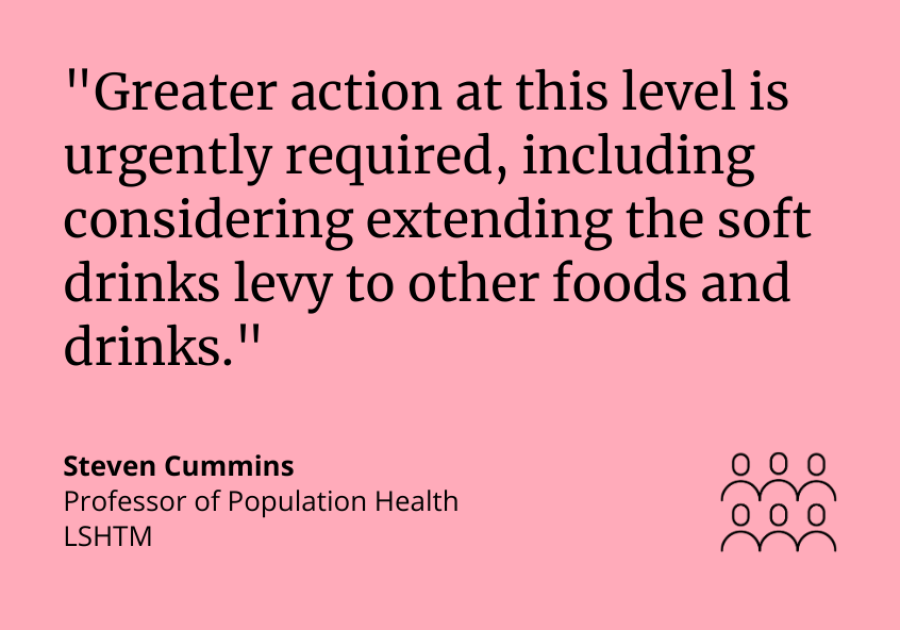Expert Comment – 'Sugar tax' on soft drinks shown to reduce sugar intake
15 July 2024 London School of Hygiene & Tropical Medicine London School of Hygiene & Tropical Medicine https://lshtm.ac.uk/themes/custom/lshtm/images/lshtm-logo-black.png
Steven Cummins quote card: Greater action at this level is urgently required, including considering extending the soft drinks levy to other foods and drinks.
A levy on sugar in soft drinks (often referred to as a ‘sugar tax’) led to an estimated drop in the amount of sugar consumed by children of almost one teaspoon per day within a year, according to an analysis of UK data.
The study, involving researchers from the London School of Hygiene & Tropical Medicine (LSHTM), also indicated that by the end of the first year after the levy was introduced in 2018, adults’ sugar intake fell by the equivalent of more than two teaspoons per day.
Officially called the Soft Drinks Industry Levy (SDIL), the levy added a charge of 24p on drinks containing 8g of sugar per 100ml and 18p a litre on those with 5-8g of sugar per 100ml, directly payable by manufacturers to HM Revenue and Customs. Companies could avoid paying the levy if they reformulated their high sugar brands.
The UK government introduced it in April 2018 as part of its strategy to tackle childhood obesity.
A quarter of adults in England are currently classed as living with obesity, according to the Health Survey for England 2021. Figures from the Office for Health Improvement & Disparities show that obesity among young people has increased significantly over the past 25 years. In 1990, 5% of adolescents aged 11-15 years in England were living with obesity. By 2019 it had reached 24%, with children living in more deprived areas more than twice as likely to be living with obesity than those in richer areas. Clearly, tackling obesity is a major priority for public health.
The new analysis of the SDIL, published in the the Journal of Epidemiology and Community Health, is the first to examine sugar consumption specifically rather than data from people buying drinks.
The research team, led by the University of Cambridge, modelled the estimated impact of the sugar tax using data from 7,999 adults and 7,656 children from the UK National Diet and Nutrition Survey 2008-2019.
By the end of the first year after the levy was introduced, the estimated average daily consumption of sugar had fallen by almost 5g per day for children and almost 11g for adults compared to the expected level if the tax had not been introduced.
Commenting on the findings, study co-author Steven Cummins, Professor of Population Health at LSHTM, said: “Obesity, particularly among children, is still a major health challenge.
“This study adds to the evidence that levies on certain unhealthy products can reduce the amount of sugar they and their families consume through encouraging reformulation of products and changing behaviour.
“Children deserve a healthy start to life, and the more tools governments can use to incentivise industry to sell healthier products and to have less sugar in their diets the better.
“In the past, successive governments have placed the burden of action on individual responsibility and have been much less inclined to develop population level policies, including greater regulation of the food industry. This study provides further support for action to improve the food environment at the population level, as outlined in the National Food Strategy.
“Greater action at this level is urgently required, including considering extending the SDIL to other foods and drinks. The incoming administration could also look to local government which has been successfully innovating to improve diet and obesity in their communities.”
Professor Cummins and colleagues at LSHTM have been evaluating the impact of a range of successful local government policies, including restricting exposure to unhealthy food advertising which has reduced household purchases of energy by 1000kcal per week, and curbing the proliferation of fast-food outlets through planning policy, which has reduced the number of fast-food outlets around schools.
Globally, research has shown that taxes and levies on sugar have been effective in many national and local government jurisdictions including Mexico, South Africa, Chile and Barbados – over 73 countries now have some form of sugar tax. For example, in South Africa a 10% SSB tax led to a 29% reduction in consumption. In low-income urban households’ purchases dropped by 57%.
Publication
Rogers NT, Cummins S, Jones CP et al. Estimated changes in free sugar consumption one year after the UK soft drinks industry levy came into force: controlled interrupted time series analysis of the National Diet and Nutrition Survey (2011–2019). Journal of Epidemiology and Community Health. doi: 10.1136/jech-2023-221051
If you enjoyed this article and would like to build a career in global health, we offer a range of MSc programmes covering health and data, infectious and tropical diseases, population health, and public health and policy.
Available on campus or online, including flexible study that works around your work and home life, be part of a global community at the UK's no.1 public health university.